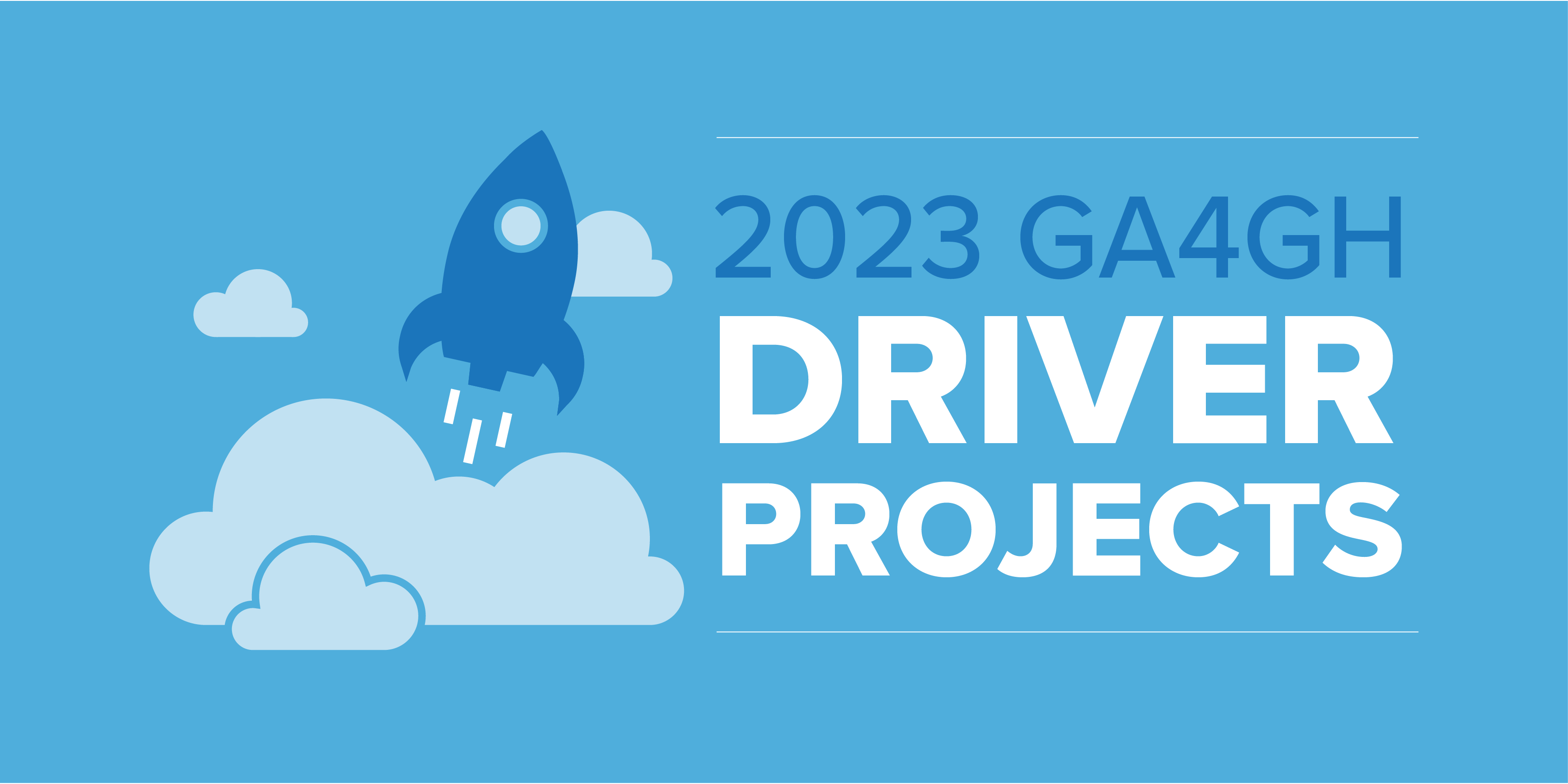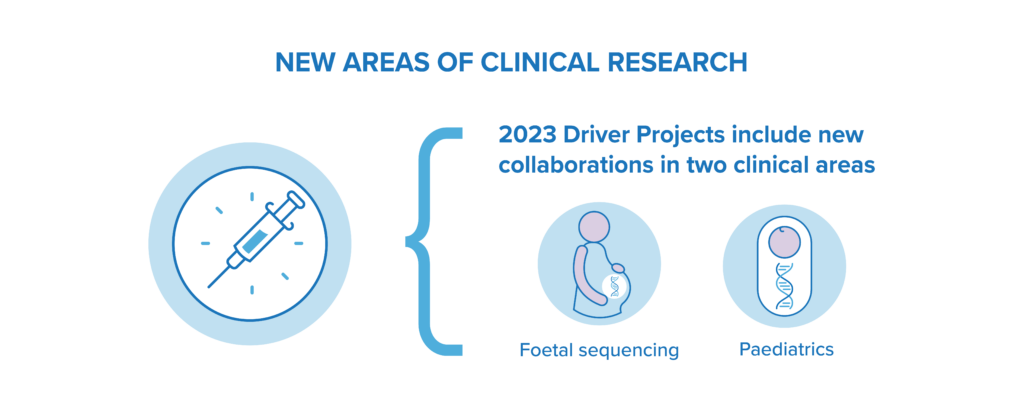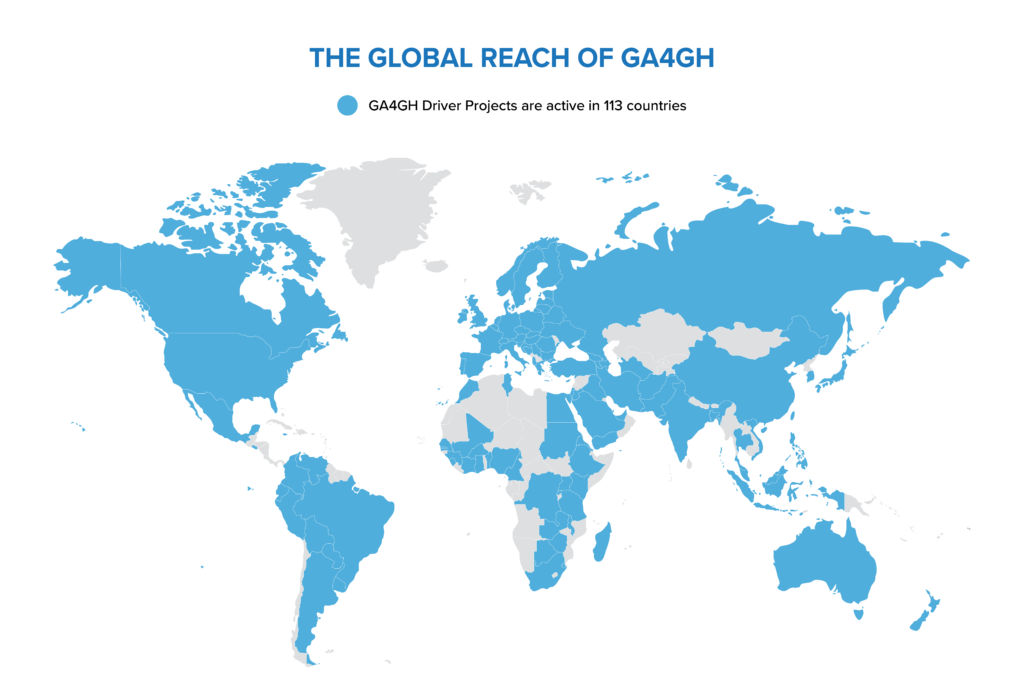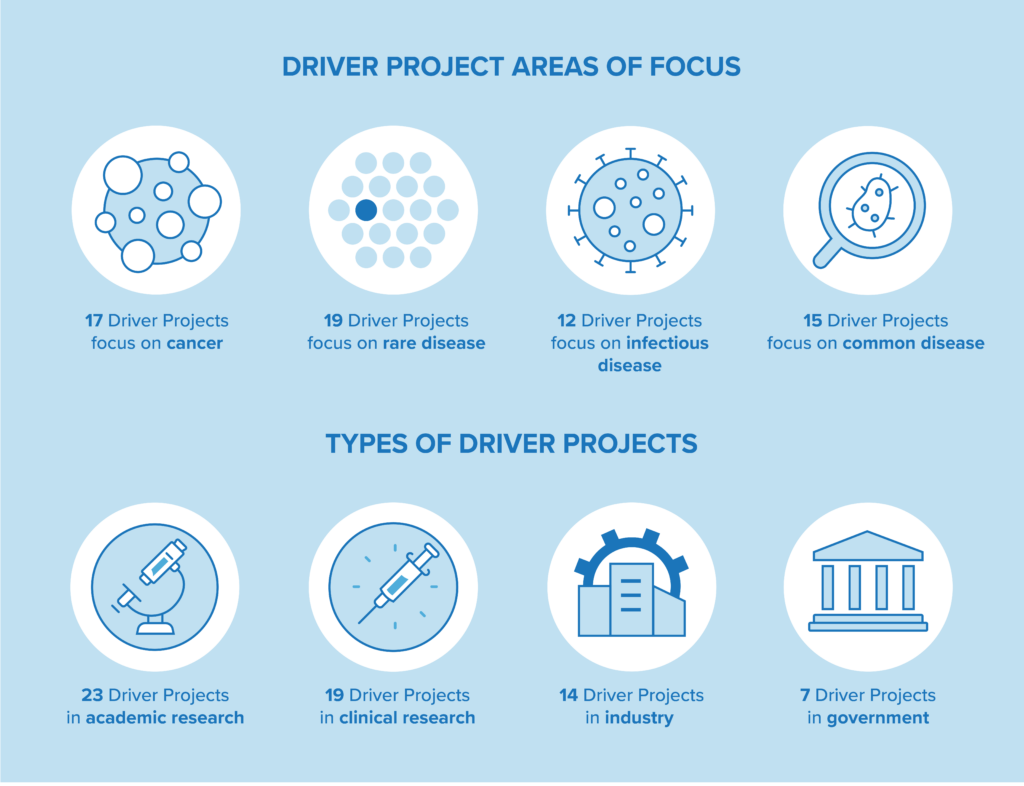About us
Learn how GA4GH helps expand responsible genomic data use to benefit human health.
Learn how GA4GH helps expand responsible genomic data use to benefit human health.
Our Strategic Road Map defines strategies, standards, and policy frameworks to support responsible global use of genomic and related health data.
Discover how a meeting of 50 leaders in genomics and medicine led to an alliance uniting more than 5,000 individuals and organisations to benefit human health.
GA4GH Inc. is a not-for-profit organisation that supports the global GA4GH community.
The GA4GH Council, consisting of the Executive Committee, Strategic Leadership Committee, and Product Steering Committee, guides our collaborative, globe-spanning alliance.
The Funders Forum brings together organisations that offer both financial support and strategic guidance.
The EDI Advisory Group responds to issues raised in the GA4GH community, finding equitable, inclusive ways to build products that benefit diverse groups.
Distributed across a number of Host Institutions, our staff team supports the mission and operations of GA4GH.
Curious who we are? Meet the people and organisations across six continents who make up GA4GH.
More than 500 organisations connected to genomics — in healthcare, research, patient advocacy, industry, and beyond — have signed onto the mission and vision of GA4GH as Organisational Members.
These core Organisational Members are genomic data initiatives that have committed resources to guide GA4GH work and pilot our products.
This subset of Organisational Members whose networks or infrastructure align with GA4GH priorities has made a long-term commitment to engaging with our community.
Local and national organisations assign experts to spend at least 30% of their time building GA4GH products.
Anyone working in genomics and related fields is invited to participate in our inclusive community by creating and using new products.
Wondering what GA4GH does? Learn how we find and overcome challenges to expanding responsible genomic data use for the benefit of human health.
Study Groups define needs. Participants survey the landscape of the genomics and health community and determine whether GA4GH can help.
Work Streams create products. Community members join together to develop technical standards, policy frameworks, and policy tools that overcome hurdles to international genomic data use.
GIF solves problems. Organisations in the forum pilot GA4GH products in real-world situations. Along the way, they troubleshoot products, suggest updates, and flag additional needs.
GIF Projects are community-led initiatives that put GA4GH products into practice in real-world scenarios.
The GIF AMA programme produces events and resources to address implementation questions and challenges.
NIF finds challenges and opportunities in genomics at a global scale. National programmes meet to share best practices, avoid incompatabilities, and help translate genomics into benefits for human health.
Communities of Interest find challenges and opportunities in areas such as rare disease, cancer, and infectious disease. Participants pinpoint real-world problems that would benefit from broad data use.
The Technical Alignment Subcommittee (TASC) supports harmonisation, interoperability, and technical alignment across GA4GH products.
Find out what’s happening with up to the minute meeting schedules for the GA4GH community.
See all our products — always free and open-source. Do you work on cloud genomics, data discovery, user access, data security or regulatory policy and ethics? Need to represent genomic, phenotypic, or clinical data? We’ve got a solution for you.
All GA4GH standards, frameworks, and tools follow the Product Development and Approval Process before being officially adopted.
Learn how other organisations have implemented GA4GH products to solve real-world problems.
Help us transform the future of genomic data use! See how GA4GH can benefit you — whether you’re using our products, writing our standards, subscribing to a newsletter, or more.
Join our community! Explore opportunities to participate in or lead GA4GH activities.
Help create new global standards and frameworks for responsible genomic data use.
Align your organisation with the GA4GH mission and vision.
Want to advance both your career and responsible genomic data sharing at the same time? See our open leadership opportunities.
Join our international team and help us advance genomic data use for the benefit of human health.
Discover current opportunities to engage with GA4GH. Share feedback on our products, apply for volunteer leadership roles, and contribute your expertise to shape the future of genomic data sharing.
Solve real problems by aligning your organisation with the world’s genomics standards. We offer software dvelopers both customisable and out-of-the-box solutions to help you get started.
Learn more about upcoming GA4GH events. See reports and recordings from our past events.
Speak directly to the global genomics and health community while supporting GA4GH strategy.
Be the first to hear about the latest GA4GH products, upcoming meetings, new initiatives, and more.
Questions? We would love to hear from you.
Read news, stories, and insights from the forefront of genomic and clinical data use.
Attend an upcoming GA4GH event, or view meeting reports from past events.
See new projects, updates, and calls for support from the Work Streams.
Read academic papers coauthored by GA4GH contributors.
Listen to our podcast OmicsXchange, featuring discussions from leaders in the world of genomics, health, and data sharing.
Check out our videos, then subscribe to our YouTube channel for more content.
View the latest GA4GH updates, Genomics and Health News, Implementation Notes, GDPR Briefs, and more.
Discover all things GA4GH: explore our news, events, videos, podcasts, announcements, publications, and newsletters.
20 Sep 2023
The new GA4GH Driver Projects are the Biomedical Research Hub, the Human Pangenome Project, imCORE®, the International Precision Child Health Partnership, NHLBI BioData Catalyst®, the NIH Cloud Platform Interoperability effort, the Repository of the International Fetal Genomics Consortium, and expected in the coming weeks, the European Genomic Data Infrastructure, Qatar Genome Program, and the European Open Science Cloud for Cancer.

SAN FRANCISCO, CALIFORNIA, USA — The Global Alliance for Genomics and Health (GA4GH) named 10 world-leading genomic data initiatives with clinical connections as its newest Driver Projects. The collaborations will allow genomic data standards to make new inroads into medicine and biomedical research, important areas like foetal and child health, and diverse regions around the globe.
“Together, all GA4GH Driver Projects provide access to nearly 4 million genomes and more than 15 petabytes of real data. That kind of data power will drive an enormous transformation in human health. It’s fantastic to see the wide range of initiatives that have joined GA4GH as new Driver Projects and are committing to ramping up responsible genomic data use — from the Qatari health system, to a pregnancy sequencing repository, to federated data platforms for the US National Institutes of Health and for the European region.”
— Ewan Birney, Chair of GA4GH, Deputy Director General of the European Molecular Biology Laboratory
Birney announced the new Driver Projects at the GA4GH 11th Plenary meeting in San Francisco.
GA4GH Driver Projects are real-world initiatives that help build and implement GA4GH standards, tools, and frameworks. They give voice to the broader genomics community and ensure GA4GH products serve real needs.
As of today, seven projects have joined GA4GH as new Driver Projects: the Biomedical Research Hub (BRH), the Human Pangenome Project (HPP), Immunotherapy Centers of Research Excellence (imCORE®), the International Precision Child Health Partnership (IPCHiP), NHLBI BioData Catalyst® (BDC), the NIH Cloud Platform Interoperability (NCPI) effort, and the Repository of the International Fetal Genomics Consortium (RIFGC).
Three more are expected to join in the coming weeks in the areas of cancer research and national infrastructure: the European Genomic Data Infrastructure (GDI), Qatar Genome Program of Qatar Foundation, and European Open Science Cloud for Cancer (EOSC4Cancer).

All the new Driver Projects increase the GA4GH connection with the clinical community — a key priority in the GA4GH Strategic Road Map released earlier this year.
“For genomic data standards to make a difference to patients, we need to build bridges with clinical partners. The 10 new GA4GH Driver Projects will foster such engagement between research, medicine, and standards development,” said Heidi Rehm, a Vice-Chair of GA4GH, Chief Genomics Officer at Massachusetts General Hospital, and Co-Director of the Program in Medical and Population Genetics at the Broad Institute of MIT and Harvard.
Two Driver Projects reflect an expanding collaboration between GA4GH and the National Institutes of Health (NIH) in the US. NHLBI BioData Catalyst® (BDC) offers a cloud-based ecosystem with data and analytic capabilities to advance research on heart, lung, blood, and sleep diseases, disorders, and conditions. The NIH Cloud Platform Interoperability (NCPI) effort already relies on GA4GH standards in its work to establish a federated data ecosystem across cloud platforms at the NIH.
The Biomedical Research Hub (BRH) makes patient data, including international patient data, available for research via federation — the process of running computational analyses on data remotely, rather than a researcher downloading or accessing raw data.
The academic-industry partnership Immunotherapy Centers of Research Excellence (imCORE®) brings together leading scientists and oncologists in multi-centre, data-focused collaborations for basic, clinical, and translational research. Funded by Roche, imCORE® is building a global data analysis platform to advance cancer immunotherapy research and development to improve patient outcomes.
Two Driver Projects expected to join in the coming weeks aim to connect European genomic data platforms with healthcare and biomedical research.
The European Genomic Data Infrastructure (GDI) will use federation to make genomic and health data across Europe accessible to approved clinicians, scientists, and healthcare policymakers.*
The European Open Science Cloud for Cancer (EOSC4Cancer) plans to make well-curated data available to speed up cancer research at every stage of the patient journey, from prevention to diagnosis to treatment.

The new Driver Projects also expand the reach of GA4GH to vital areas within medicine: foetal sequencing and paediatrics.
“GA4GH is delighted to launch our very first collaboration involving foetal sequencing, and separately, our first GA4GH Driver Project focused on paediatrics,” said Kathryn North, Director of Murdoch Children’s Research Institute and Australian Genomics, and a Vice-Chair of GA4GH.
“No one hospital holds all the data it needs to treat children with rare conditions and give critical information to expectant parents. International collaborations and responsible data reuse are absolutely essential to better health outcomes for kids,” North said.
North also co-leads the International Precision Child Health Partnership (IPCHiP), which brings together four leading children’s health institutions on three continents to develop an evidence base for rare paediatric disease. Showing the power of international collaborations, IPCHiP has already highlighted how feasible it is to implement rapid genome sequencing when taking care of infants with new-onset epilepsy.
Meanwhile, the Repository of the International Fetal Genomics Consortium (RIFGC) will work with GA4GH on standardising data from pregnancy sequencing projects, an area of clinical genomics gaining significant attention worldwide. The data will improve what we know about stillbirths, birth anomalies, and maternal-foetal health.
 Strengthening ties across the globe
Strengthening ties across the globeThe new additions bring the total cohort of GA4GH Driver Projects to 28, with representation from 113 countries.
“To fulfil its mission as a truly global alliance that benefits the health of everyone, GA4GH will strengthen ties in the Middle East and partner with transcontinental genomic data resources through its new Driver Projects,” said Peter Goodhand, CEO of GA4GH.
Expanding connections between GA4GH and the Middle East, the Qatar Genome Program of Qatar Foundation will develop a national genomic data resource to improve health in both Qatar and the wider region.
The Human Pangenome Project (HPP) aims to provide access to genomes that represent the full global diversity of the human population. HPP connects partners in both Northern and Southern Africa; the UK; East Asia; the Middle East; Europe; and South, Central, and North America.
Other new Driver Projects build alliances across continents, including imCORE®, IPCHiP, BRH, and RIFGC.
 Shaping the future of genomic data use
Shaping the future of genomic data useWhile Driver Projects represent organisations who have committed resources to GA4GH activities, everyone in the genomics and health community is invited to develop and use GA4GH products by joining a Work Stream, joining as an Organisational Member, or getting involved in another fully open GA4GH group.
The new Driver Projects were unanimously approved by the GA4GH Executive Committee after evaluation by an External Review Board, chaired by Melanie Courtot (Ontario Institute for Cancer Research) and consisting of Ashley Hobb (DNAstack), Jacob Shujui Hsu (National Taiwan University), Jorge Melendez-Zajgla (Instituto Nacional de Medicina Genómica), Alessandro Riccombeni (Microsoft UK), Zornitza Stark (Victorian Clinical Genetics Service), and Daryl Waggott (Genome Canada).
Projects were evaluated on their ability to expand GA4GH’s global geographic footprint and application to global health, as well as to contribute to GA4GH activities. All projects have a mission and goals that depend on real-world genomic interoperability.
“The standards that GA4GH builds will influence genomics and health for decades to come. We were really pleased to see such important and promising initiatives step forward as GA4GH Driver Projects to work with us to shape that future,” said Courtot.
*GDI is funded by the European Commission under the Digital Europe Programme under grant agreement number 101081813 and through co-funding from participating Member States.
Disclaimer: The content of this release is solely the responsibility of the authors and does not necessarily represent the official views of the National Institutes of Health.